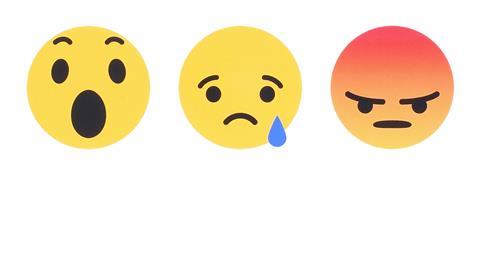Facebook isn’t here to make friends. It’s here to make money, comments Amelia Kallman.
In 2017, each individual Facebook user in Europe generated approximately $27.26 in revenue for the company, while users in North America were worth about $84.41 each. All together, we the people helped Facebook make $40 billion in profit last year as it connected its users with eager advertisers.
While Facebook profits from our posts about families, friends, activities, and concerns about the future, many users report feeling overly reliant on social media, dependent on the hit of dopamine released in anticipation of pleasure from a new like, message, friend request or comment. By cheapening access to this natural brain drug, our dopamine receptors downgrade, resulting in an increase in mood swings, anxiety, irritability, loss of focus and lowered self-esteem.

Since the Cambridge Analytica scandal broke earlier this year the company has been thrown into a mid-life crisis. New security regulations and user concerns pushed shares down 20%, wiping out almost $130 billion in market value. Besides the financial impact, its likability has also taken a blow.
One of the biggest challenges to Facebook’s growth is that it is running out of people. It is involved in initiatives to bring the internet to disconnected places throughout the world, but given that many of these places are using 2G or 3G, it poses problems for video content, which is an important source of ad revenue. This means that the company must focus on how to increase the value of users to advertisers. They have also recently announced they will be creating new revenue streams, like monetising WhatsApp, an app owned by Facebook.
We have seen Facebook sit back and relax these last few years, as it hasn’t needed to innovate, coasting as it buys up innovative companies and mimics features from other successful apps. It would be an extreme challenge for a rival start-up to meet the regulations and security standards necessary to compete against the giant today. Yet the company relies on usership, and if people jump ship, the empire collapses.
That’s not likely to happen anytime soon though, simply because people resist change and users are aware of how much time and data they have already invested into the site. ‘Yeah it may suck, but the damage has been done, and anyways, how would I know if the Homecoming Queen got fat? If my ex looks happy in a photo? If my mother’s cousin-twice-removed is a racist?’
I quit Facebook back in May and don’t miss it at all. I’ve noticed that now I put more effort into maintaining and nurturing my real life relationships, and get a much greater return on this investment than I did on Facebook.
The only downside was I saw a direct correlation with the amount of time I spent on Facebook-owned Instagram, said to be the most damaging out of all the social media sites. For me the answer was a two-week detox, but that ended when my vacation started and I had to show everyone where I was and what I was doing because, look at me, I’m really cool.
Now I’m back to a diet of moderation and mindfulness, knowing all too well that these apps aren’t here to help me feel connected or improve my wellbeing. Extricating myself from Facebook took days, literally, and every time I thought I was done deleting posts, photos, messaging and leaving groups and so on, more layers of the data I so freely gave away were revealed.
The most frightening part was the final steps under Settings down on the lower left hand side, with headings like ‘Apps and websites’ where I found the pages and pages of companies I had ‘given permission’ to access my data, and all the pages of ‘interests’ the site had on me from clicks I’d made over the last ten years. If you are still on Facebook I definitely advise you to take a close look at this page.
Facebook is showing signs that it may be preparing for a pivot. They’ve made the slow burn investment into virtual reality with the Oculus and Facebook Spaces, their social VR site. With costs going down and quality going up, it may still take years to populate but social activity, x-commerce (experiential commerce), and new revenue opportunities in the Metaverse are only expected to expand.
The company has also recently set up a Blockchain committee and relinquished its rules about not advertising cryto-currency on the site. There’s speculation on whether this is only to better understand where competition may come from, or if we can expect the company to be dipping its toes into the crypto-waters soon. That would be ironic because Facebook is essentially the antithesis of a decentralised internet, the big objective that blockchain was founded on.
While it may be ironic, turning the site into a peer-to-peer marketplace, holding the ledgers and its own currency, while taking a percentage from every transaction, is not unimaginable.
If Facebook was to get into the crypto game now, introducing and establishing it to its 2.23 billion users it would mark the start of a crypto revolution, disrupting everything.
It would be a bold move, one that would make it exciting again, challenge the status quo, and give it a leg-up over Amazon, Google, and Microsoft, not to mention many governments and banks. But given the current scrutiny the company is under, a revolution might be too much to hope for.
As Facebook adjusts to middle-age and continues to state that data misuse is not its friend, its status as an advertisement platform becomes increasingly transparent, lessening its emotional value and appeal. Individuals are starting to reach personal tipping points, recognising the diminishing returns they receive from spending time on the platform.
Perhaps the biggest threat to the future of Facebook is not a rival app or an emerging technology, but rather people pondering whether they are a digital slave working for the profit of billionaires.
Amelia Kallman is a futurist, speaker, journalist, author, nightclub owner and director of the first virtual reality burlesque show. Read more of her IBC365 articles here.

























No comments yet